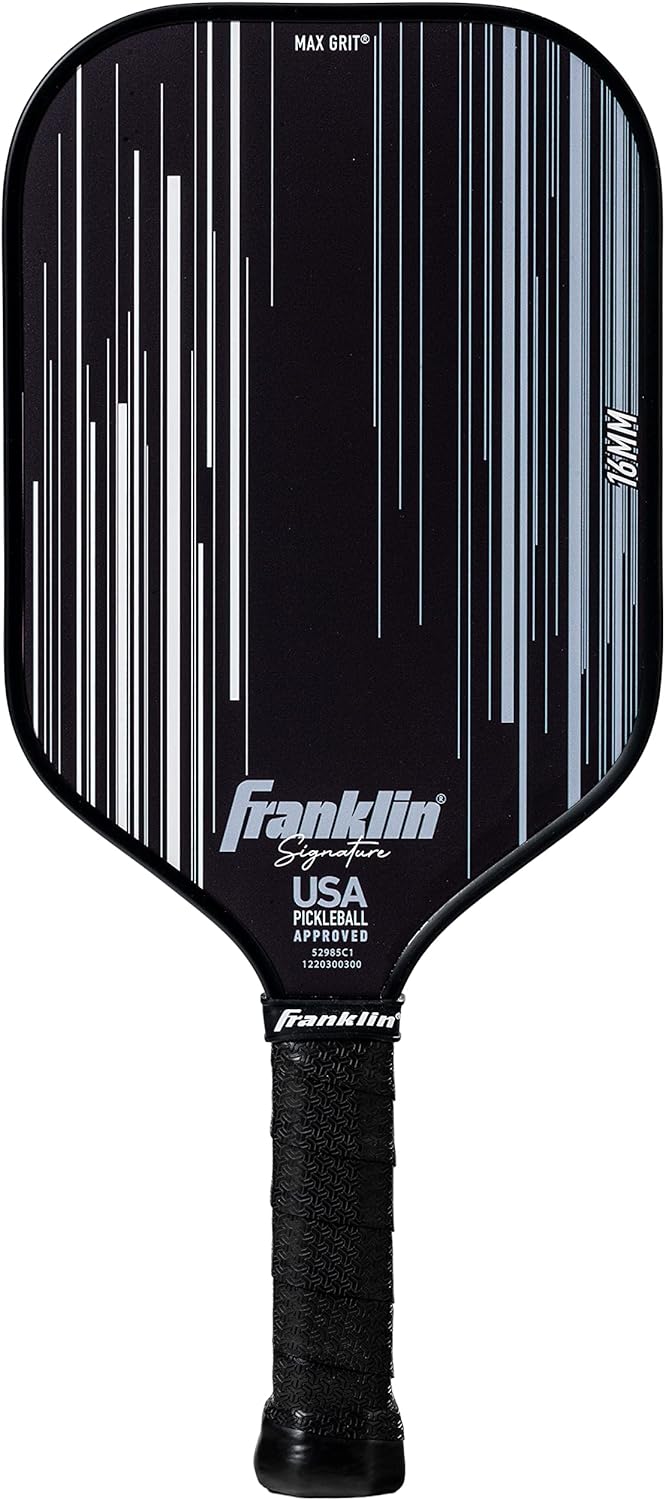Choosing the right pickleball paddle is crucial for senior players to enhance their performance and prevent injuries. The ideal paddle weight can vary based on individual preferences, playing style, and physical condition. This comprehensive guide will help senior players make an informed decision about the best pickleball paddle weight for their needs.
Understanding Pickleball Paddle Weights
Lightweight Paddles (6.5 – 7.8 ounces)
Lightweight paddles are generally recommended for seniors due to their ease of handling and reduced strain on the wrist, elbow, and shoulder joints. These paddles offer better control and maneuverability, making them ideal for players who prioritize precision and finesse over power.
Midweight Paddles (7.3 – 8.4 ounces)
Midweight paddles provide a balance between power and control. They are suitable for male senior players who require a bit more power behind their shots without compromising too much on control. These paddles are manageable for quick volleys and sustained play.
Heavyweight Paddles (7.8 – 8.5 ounces and above)
Heavyweight paddles generate more power with less effort, beneficial for driving the ball deep into the opponent’s court or executing powerful serves and smashes. However, they can be more tiring to use over long periods, potentially leading to increased fatigue or strain. They might be less suitable for players with previous arm or shoulder injuries.
Ideal Pickleball Paddle Weight for Senior Players
For Male Senior Players
Many male senior players might prefer paddles in the 7.3 to 8.4 ounces range. This weight provides a good balance between power and control, allowing for stronger serves and returns while still being manageable for quick volleys and sustained play without causing undue strain on the arm, elbow, and shoulder.
For Female Senior Players
Female senior players often opt for paddles on the lighter side, approximately 6.5 to 7.8 ounces. Lighter paddles can offer easier maneuverability and less stress on the joints, which is beneficial for play over extended periods. They allow for precise control and quick reactions at the net, which are crucial for the strategic aspects of the game.
Determining the Weight of Your Pickleball Paddle
Determining the weight of a pickleball paddle is straightforward and can be done using a few simple methods. The most accurate way to measure the weight of a pickleball paddle is by using a digital kitchen scale, which can provide a precise reading in ounces or grams. Here’s how to do it:
- Find a Digital Scale: Use a digital kitchen scale that is capable of measuring small weights accurately. Make sure the scale is calibrated and set to the correct unit of measurement (ounces or grams) that you wish to use.
- Prepare the Paddle: Before weighing, ensure that the paddle is free of any additional items like ball holders or grip tape that you might have added and aren’t part of the paddle’s original weight. This will give you an accurate measurement of the paddle itself.
- Weigh the Paddle: Place the paddle gently on the scale, making sure it is fully supported and not touching anything else. Wait for the reading to stabilize and take note of the weight displayed.
- Compare with Specifications: For a new purchase, you can also compare the weight measured with the manufacturer’s specifications, which are often listed on their website or product packaging. This can help confirm the accuracy of your measurement.
Choosing Between a Lighter or Heavier Paddle
The choice between a lighter or heavier pickleball paddle depends on your playing style, physical strength, and personal preferences. Each has its advantages and considerations:
Lighter Paddles (6.5 – 7.5 ounces)
Pros:
- Easier to maneuver
- Less strain on the wrist, arm, and shoulder
- Better control, ideal for precision and finesse
Cons:
- May provide less power behind shots
- Requires more effort to generate speed
Heavyweight Paddles (7.8 – 8.5 ounces and above)
Pros:
- Generate more power with less effort
- Offer more stability upon impact
- Beneficial for powerful serves and smashes
Cons:
- Can be more tiring to use over long periods
- Might increase fatigue or strain
- Less suitable for players with previous arm or shoulder injuries
Making The Choice
When it comes to choosing the right paddle for your game, there are a few key factors to consider. Whether you’re a seasoned player or just starting out, finding the paddle that suits your playing style, physical considerations, and personal preferences is crucial for enhancing your performance on the court.
First and foremost, your playing style is an important factor to consider. Are you the type of player who relies on quick reactions and finesse? Or do you prefer a more powerful approach with deep shots? Understanding your playing style will help you determine the weight of the paddle that will work best for you. For those who crave agility and maneuverability, a lighter paddle may be the way to go. On the other hand, if power and strong shots are your game, a heavier paddle may be more suitable.
Physical considerations should also be taken into account. If you have concerns about arm, wrist, or shoulder strain, choosing a lighter paddle can help minimize the risk of injury. A lighter paddle puts less strain on your muscles and joints, allowing you to play comfortably for longer periods without discomfort.
However, personal preference should never be overlooked. After all, you’re the one who will be wielding the paddle, so it’s important that it feels comfortable and natural in your hands. The best way to determine this is by testing paddles of different weights. Take the time to visit a sports store or borrow paddles from friends to see how they feel in your hands. This hands-on approach will give you a better understanding of what weight suits you best and enhances your overall game.
In summary, there is no one-size-fits-all answer when it comes to choosing the perfect paddle. It’s a combination of understanding your playing style, considering your physical condition, and testing out different options. By taking these factors into account, you’ll be able to find the paddle that feels most natural in your hands and enhances your game on the court. So, don’t rush the decision; take your time and find the perfect paddle that will help you reach new heights in your table tennis journey.
When Should a Senior Choose a Heavier Pickleball Paddle?
Selecting the right pickleball paddle weight is crucial for senior players aiming to optimize their game. While lighter paddles are often recommended for ease of handling, there are specific scenarios where a heavier paddle might be the better choice. Here’s an in-depth look at when seniors should consider opting for a heavier pickleball paddle.
Situations Favoring a Heavier Paddle
Enhancing Power
A heavier paddle naturally delivers more power behind each shot with less physical exertion. For senior players who prefer driving the ball deep into their opponent’s court or executing powerful serves, a heavier paddle can be a significant advantage. The added weight helps in generating momentum, making it easier to hit powerful shots consistently.
Stability and Control
Heavier paddles provide increased stability upon impact, reducing vibrations and making it easier to control the ball. This stability can be particularly beneficial for seniors aiming to improve their accuracy and reduce the likelihood of the ball deflecting at unintended angles. The added weight ensures a more stable and controlled hit, enhancing overall gameplay.
Physical Fitness
Seniors in good physical condition, with strong arms and shoulders, may find the heft of a heavier paddle advantageous. The additional weight can enhance their game without significantly increasing the risk of injury. However, it’s essential to ensure that the player does not have pre-existing conditions such as arthritis or tendonitis, which could be exacerbated by the use of a heavier paddle.
Doubles Play
In doubles play, quick net exchanges and powerful shots are common. A heavier paddle can be a valuable asset, allowing for quick volleys and powerful smashes. Seniors playing doubles can benefit from the added power and stability, making them more competitive in fast-paced scenarios.
Preference for Groundstrokes
Players who rely more on groundstrokes from the baseline rather than quick net play might benefit from the extra momentum a heavier paddle provides. The added weight helps in generating deeper and more powerful shots, making it easier to control the game from the baseline.
Considerations for Choosing a Heavier Paddle
While a heavier paddle can offer numerous benefits, it’s crucial for senior players to carefully consider their physical capabilities and any pre-existing conditions. Here are a few points to keep in mind:
- Physical Condition: Ensure that the player’s physical condition can handle the added weight without causing strain or injury.
- Pre-existing Conditions: Avoid using a heavier paddle if the player has conditions like arthritis or tendonitis, as it could exacerbate these issues.
- Comfort and Preference: Ultimately, the paddle should feel comfortable in the player’s hand. Testing different weights can help determine the best fit.
Top Pickleball Paddles for Seniors
Here are three highly regarded pickleball paddle models that cater to the needs and preferences of senior players:
Best Seller
In Stock
Selkirk Amped S2 X5 FiberFlex Pickleball Paddle
Features: The Selkirk Amped S2 stands out for its innovative FiberFlex fiberglass face and X5 polypropylene honeycomb core, providing an excellent balance of power and control.
It features a comfortable grip and a large sweet spot, making it easier to hit the ball consistently. Available in both lightweight and midweight options, it allows seniors to choose based on their preference for maneuverability or power.
Ideal For: Seniors seeking a high-quality paddle that offers versatility and comfort during play.
Best Seller
In Stock

Franklin Signature Pickleball Paddle
Features: The Franklin Signature Paddle boasts a lightweight construction, allowing for easy handling and reduced arm fatigue, making it an excellent choice for extended play sessions.
Its ergonomic grip is designed to minimize strain on the hands and wrists. The paddle also features a wide body shape, ideal for players who value precision and consistency in their play.
Ideal For: Players seeking forgiveness in their shots and improved accuracy on the court.
3. Paddletek Tempest Wave Pro Pickleball Paddle
Best Seller
In Stock
Paddletek Tempest Wave Pro Pickleball Paddle
Features: The Tempest Wave Pro features a high-grade graphite face and a polymer core, balancing control and power beautifully. Its lightweight design makes it easy to handle, reducing the risk of arm fatigue.
The paddle also boasts a comfortable grip size and a long handle, making it easier for seniors to hold and swing.
Ideal For: Seniors looking for a paddle that combines control, power, and ease of handling.
In conclusion, while a heavier pickleball paddle can offer significant advantages in terms of power and stability, it’s essential for senior players to carefully consider their physical condition and personal preferences. By testing different paddles and weights, seniors can find the perfect paddle to enhance their game and enjoy their time on the court.





